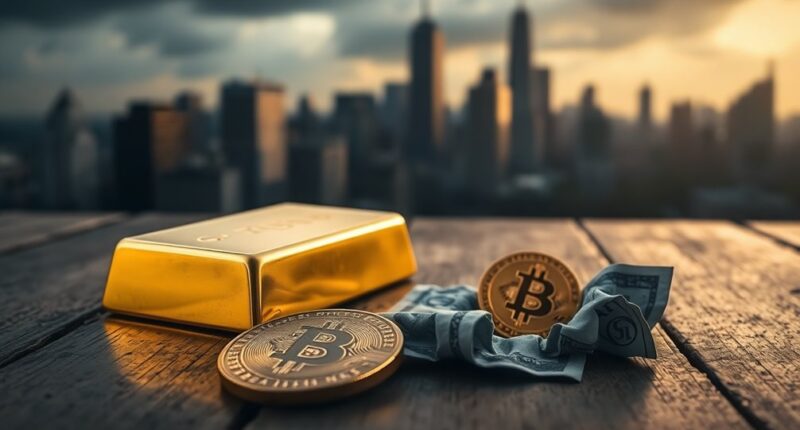As Trump's trade war escalates, you're likely noticing a shift in investment strategies. Gold is emerging as the go-to safe-haven asset, gaining traction amidst economic uncertainty. Meanwhile, Bitcoin seems to be losing its luster, struggling to hold its ground. This shift could reshape how you view your portfolio's stability. What factors are driving these changes, and how might they impact your investment choices moving forward?

In today's turbulent economic landscape, gold shines brighter than ever as the leading safe-haven asset. You've likely noticed how gold consistently performs well during economic crises, whether it was the global financial crisis or the COVID-19 pandemic. With recent price movements in 2025, gold reached record highs, driven by escalating trade tensions. This trend suggests that now might be the time to consider gold in your investment strategy.
As inflation concerns grow amidst escalating trade tariffs, many investors see gold as a reliable hedge. When the economy falters, so does confidence in fiat currencies, and that's where gold steps in. As trade wars between the U.S. and major economies like China heat up, you can't ignore the rising demand for gold. Analysts even predict that if these tensions continue, gold prices could soar to $3,000, making it essential to keep a close eye on market developments. Gold IRA fees can also influence your decision-making process when investing in this asset.
The strength of the U.S. dollar plays a crucial role in gold's appeal, too. A strong dollar might typically make gold less attractive to foreign buyers, but recent dips in the dollar have supported gold prices. The U.S. dollar surge makes dollar-denominated gold less appealing for overseas buyers. Lower interest rates further boost gold's allure as a non-yielding asset, especially in an environment where market volatility and economic uncertainty are rampant. You'll likely find that global political instability only adds to gold's value as a safe haven.
While gold leads the pack, it's important to note the mixed performance of gold ETFs, such as SPDR Gold Shares (GLD) and VanEck Gold Miners (GDX). Despite gold's rise, these ETFs have seen varied market responses. Investor sentiment remains optimistic, particularly if trade tensions persist.
GDX, for example, has a Moderate Buy consensus with a potential upside of 17.07%, which you might find appealing as a diversification tool in your portfolio.
If you've been following the market, you may have noticed that Bitcoin, once considered a safe-haven asset, isn't currently moving in tandem with gold. In fact, gold has outperformed Bitcoin lately, reinforcing its traditional safe-haven status. Given the current climate, you might find that diversifying between gold and other assets like Bitcoin could enhance your risk management strategy.
In this shifting landscape, gold remains the cornerstone of safe-haven investing, while Bitcoin takes a backseat. It's time to reassess your investment choices and consider the enduring value of gold.









